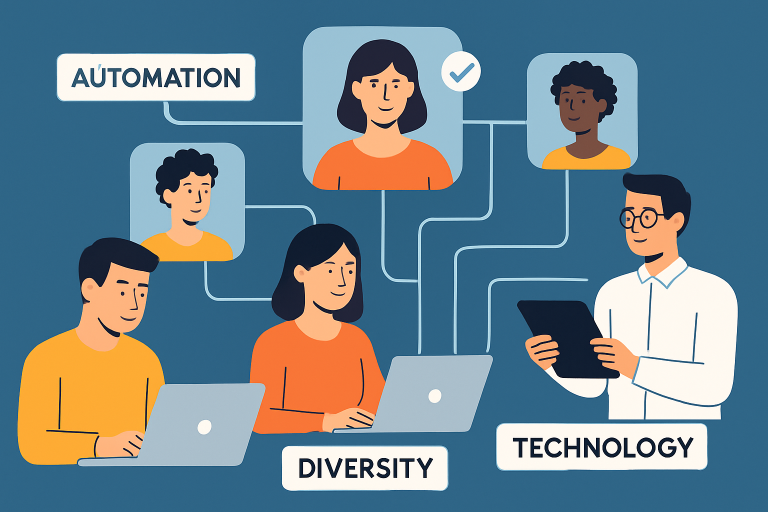Key Takeaways
- Artificial Intelligence (AI) and automation are revolutionizing candidate screening and matching.
- Virtual interviews and remote recruitment tools are becoming standard practices.
- Emphasis on Diversity, Equity, and Inclusion (DEI) is shaping recruitment strategies.
- Data-driven decision-making enhances hiring efficiency and effectiveness.
Table of Contents
- Introduction
- AI and Automation in Candidate Screening
- Virtual Interviews and Remote Recruitment
- Emphasizing Diversity, Equity, and Inclusion
- Data-Driven Decision Making
- Enhancing Candidate Experience
- Future Trends in Recruiting Technology
Introduction
In today’s competitive talent landscape, organizations face mounting pressure to enhance their hiring strategies and attract top-tier candidates. Leveraging technology is essential for streamlining recruitment, improving candidate experiences, and improving hiring outcomes. Modern tools powered by artificial intelligence and automation enable hiring teams to focus on meaningful, human-centered decisions while minimizing technical jargon and tedious manual tasks.
As businesses realize the value of digital transformation within HR, they increasingly rely on innovative recruiting software to gain a strategic edge. Recruiting software companies, such as Greenhouse, have developed systems that revolutionize core functions—resume parsing, candidate engagement, and process analysis—making hiring faster and more equitable. This article explores the key elements of modern recruiting technology and how organizations can harness them to build stronger, fairer, and more agile hiring processes.
AI and Automation in Candidate Screening
Artificial Intelligence (AI) transforms recruitment by automating time-consuming tasks and supporting more accurate candidate matching. AI-powered platforms can parse thousands of resumes in minutes, extracting key skills and experiences that align with job specifications. Machine learning algorithms reduce biases associated with manual screening, as decisions are driven by pre-set criteria rather than subjective interpretation. By deploying automation, hiring teams save valuable hours and divert energy toward higher-value activities like relationship building and candidate evaluation.
Moreover, AI tools support more agile responses to job market shifts, as automated analytics alert recruiting teams to changes in candidate pools or in-demand skill sets. These technologies have drastically improved the overall quality of screening by identifying strong candidates who may have previously been overlooked due to non-traditional backgrounds or unconventional resumes. For a deeper dive into AI’s impact on jobs and industries, see this report from Forbes.
Virtual Interviews and Remote Recruitment
The rise of remote work has fundamentally reshaped hiring. Virtual interviews are now standard, with digital platforms connecting recruiters and candidates across distances. Video interview tools offer automated scheduling, real-time recording, and even AI-driven analysis of candidate responses, helping ensure a consistent and objective evaluation process. In addition, cloud-based applicant tracking systems facilitate remote collaboration among hiring managers, making it easier to assess candidate fit and accelerate decision-making collectively.
These advancements improve organizational efficiency and expand access to a more diverse talent pool. By eliminating the need for in-person meetings early in the process, companies can engage with candidates who otherwise might have faced geographic or logistical barriers. According to a recent study by SHRM, the adoption of virtual interviewing technology has significantly improved both candidate participation and satisfaction rates.
Emphasizing Diversity, Equity, and Inclusion
Recruiting technologies are essential in advancing Diversity, Equity, and Inclusion (DEI) initiatives. AI-driven platforms analyze job postings for biased language, recommend more inclusive phrasing, and anonymize candidate data to support blind hiring. Organizations can help ensure that qualifications—not unconscious bias—drive advancement through the funnel by stripping out identifiers like names, photos, and addresses during early screening.
Furthermore, modern recruitment tools can track DEI metrics at every stage, enabling organizations to identify bottlenecks or disparities and refine their approaches accordingly. Building a diverse workforce is no longer a compliance box to check but a top strategic priority, supported by robust analytics and transparency in the recruitment process.
Data-Driven Decision Making
Data analytics have cemented their place at the center of effective recruiting. Talent acquisition teams now leverage dashboards to monitor key metrics such as source of hire, candidate drop-off rates, and time-to-fill. Analytical insights reveal which channels yield the best candidates and pinpoint inefficiencies in the hiring pipeline. Predictive analytics, meanwhile, empower organizations to forecast future talent needs and respond proactively to market trends.
With transparent, evidence-based reporting, companies can make smarter investments in sourcing channels, refine job descriptions, and calibrate their interview processes to eliminate friction. This data-driven approach to hiring continually raises the bar for both operational effectiveness and candidate quality.
Enhancing Candidate Experience
An organization’s reputation in the candidate market is often shaped by job seekers’ experiences. Top talents expect streamlined, responsive hiring that values their time and provides crystal-clear communication. Automated chatbots answer candidate questions instantly and offer status updates, while personalized email flows nurture relationships through each recruitment touchpoint.
Transparent processes, prompt feedback, and access to relevant information create trust and differentiate employers as respectful partners. Candidates who enjoy a positive, well-managed process are more likely to accept offers and promote the organization to peers, making candidate experience a crucial competitive lever.
Future Trends in Recruiting Technology
Looking ahead, the next frontier of recruitment technology includes immersive tools such as Virtual Reality (VR) and Augmented Reality (AR), which give candidates hands-on previews of roles and workplaces. These technologies help set realistic job expectations and foster a deeper connection between employers and prospective hires. Additionally, the integration of blockchain for credential verification holds promise for reducing fraud and increasing trust in the authenticity of resumes and certificates.
As digital transformation continues, the synergy of automation, data analytics, and immersive technology will further redefine the landscape, positioning forward-thinking organizations as employers of choice.
By embracing these innovations, companies position themselves to optimize operational efficiency and elevate every stakeholder’s experience. Investment in modern recruiting software and technology is no longer optional—it’s a definitive step toward building a workforce for the future.
- A Hiking & Travel Guide to Vietnam Mountains, Rice Terraces & Cultural Wonders - December 5, 2025
- Glam & Glowing: Long Holiday Hairstyles That Turn Heads - November 10, 2025
- Differences a Professional Powder Coating Gun Makes in Coating Consistency - October 17, 2025






Excellent and timely article, Rohit. You’ve perfectly captured how technology is no longer just a tool for efficiency but a strategic partner in building a fairer, stronger, and more human hiring process. The emphasis on using AI and data to enhance DEI and candidate experience, rather than replace human connection, is so crucial. Thanks for the insightful read